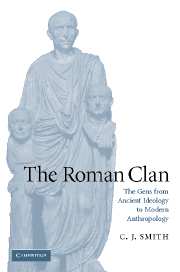Book contents
- Frontmatter
- Contents
- List of illustrations
- Preface
- List of abbreviations
- General introduction
- Part I THE EVIDENCE FOR THE GENS
- Chapter 1 The ancient evidence
- Chapter 2 Modern interpretations
- Chapter 3 The gens in the mirror: Roman gens and Attic genos
- Chapter 4 Archaeology and the gens
- Part I: Conclusion
- Part II TOWARDS AN INTERPRETATION OF THE GENS
- Appendix 1 Dionysius of Halicarnassus on the Roman curiae and religion
- Appendix 2 The missing curiae
- Select bibliography
- General index
- Index of ancient persons
- Index of passages discussed
Chapter 3 - The gens in the mirror: Roman gens and Attic genos
Published online by Cambridge University Press: 22 September 2009
- Frontmatter
- Contents
- List of illustrations
- Preface
- List of abbreviations
- General introduction
- Part I THE EVIDENCE FOR THE GENS
- Chapter 1 The ancient evidence
- Chapter 2 Modern interpretations
- Chapter 3 The gens in the mirror: Roman gens and Attic genos
- Chapter 4 Archaeology and the gens
- Part I: Conclusion
- Part II TOWARDS AN INTERPRETATION OF THE GENS
- Appendix 1 Dionysius of Halicarnassus on the Roman curiae and religion
- Appendix 2 The missing curiae
- Select bibliography
- General index
- Index of ancient persons
- Index of passages discussed
Summary
INTRODUCTION
It is a generally accepted and quite properly approved tenet of historical and philological method that one should not try to explain something obscure by reference to something even more obscure. The multiplication of uncertainties expands exponentially the likelihood of being completely wrong. It will seem very strange therefore to anyone with a passing knowledge of the relevant material that we should here embark on a comparison of the evidence for the Roman gens and the Athenian genos; or better, the Attic genos, since it is at least clear that the institution is represented across Athens' territory, Attica. Put briefly, the genos is even more obscure, because its origins have to be reconstructed on the basis of prior assumptions (some drawn again from the much-exploited Roman gens) and its history as an institution is still debated and discussed, with even poorer evidence than we have for the gens.
This chapter cannot hope to resolve an issue so much debated and yet so obscure. It should be said however that the comparison with the genos was a mainstay of reconstructions for Niebuhr and Morgan, and thought about the gens has perhaps had an undue influence in the past on understanding the genos. Moreover, it will be helpful to draw out the lines of the debate on the Greek side, in part as a heuristic exercise, and then to examine the question of whether the gens and genos should be seen as similar organisations.
- Type
- Chapter
- Information
- The Roman ClanThe Gens from Ancient Ideology to Modern Anthropology, pp. 114 - 143Publisher: Cambridge University PressPrint publication year: 2006



